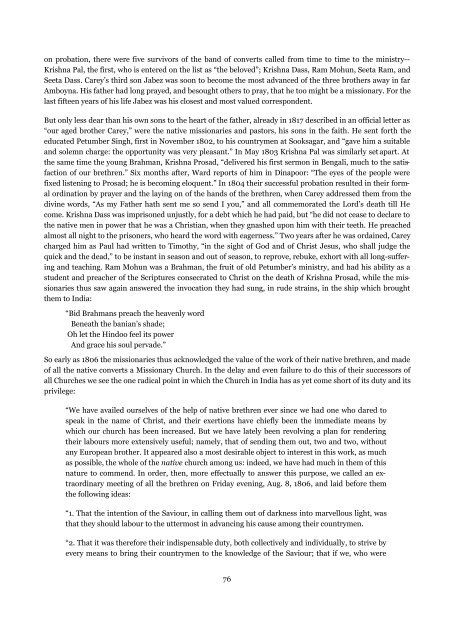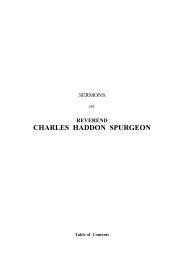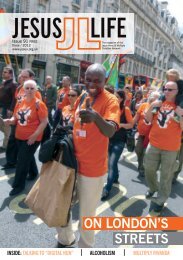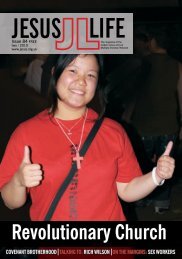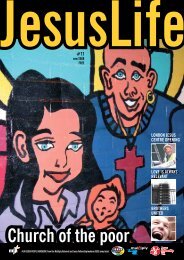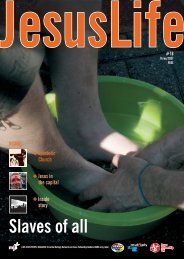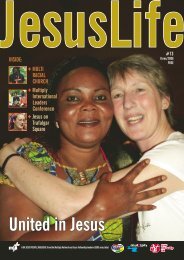Life of William Carey by George Smith - The Jesus Army
Life of William Carey by George Smith - The Jesus Army
Life of William Carey by George Smith - The Jesus Army
You also want an ePaper? Increase the reach of your titles
YUMPU automatically turns print PDFs into web optimized ePapers that Google loves.
on probation, there were five survivors <strong>of</strong> the band <strong>of</strong> converts called from time to time to the ministry--<br />
Krishna Pal, the first, who is entered on the list as “the beloved”; Krishna Dass, Ram Mohun, Seeta Ram, and<br />
Seeta Dass. <strong>Carey</strong>’s third son Jabez was soon to become the most advanced <strong>of</strong> the three brothers away in far<br />
Amboyna. His father had long prayed, and besought others to pray, that he too might be a missionary. For the<br />
last fifteen years <strong>of</strong> his life Jabez was his closest and most valued correspondent.<br />
But only less dear than his own sons to the heart <strong>of</strong> the father, already in 1817 described in an <strong>of</strong>ficial letter as<br />
“our aged brother <strong>Carey</strong>,” were the native missionaries and pastors, his sons in the faith. He sent forth the<br />
educated Petumber Singh, first in November 1802, to his countrymen at Sooksagar, and “gave him a suitable<br />
and solemn charge: the opportunity was very pleasant.” In May 1803 Krishna Pal was similarly set apart. At<br />
the same time the young Brahman, Krishna Prosad, “delivered his first sermon in Bengali, much to the satisfaction<br />
<strong>of</strong> our brethren.” Six months after, Ward reports <strong>of</strong> him in Dinapoor: “<strong>The</strong> eyes <strong>of</strong> the people were<br />
fixed listening to Prosad; he is becoming eloquent.” In 1804 their successful probation resulted in their formal<br />
ordination <strong>by</strong> prayer and the laying on <strong>of</strong> the hands <strong>of</strong> the brethren, when <strong>Carey</strong> addressed them from the<br />
divine words, “As my Father hath sent me so send I you,” and all commemorated the Lord’s death till He<br />
come. Krishna Dass was imprisoned unjustly, for a debt which he had paid, but “he did not cease to declare to<br />
the native men in power that he was a Christian, when they gnashed upon him with their teeth. He preached<br />
almost all night to the prisoners, who heard the word with eagerness.” Two years after he was ordained, <strong>Carey</strong><br />
charged him as Paul had written to Timothy, “in the sight <strong>of</strong> God and <strong>of</strong> Christ <strong>Jesus</strong>, who shall judge the<br />
quick and the dead,” to be instant in season and out <strong>of</strong> season, to reprove, rebuke, exhort with all long-suffering<br />
and teaching. Ram Mohun was a Brahman, the fruit <strong>of</strong> old Petumber’s ministry, and had his ability as a<br />
student and preacher <strong>of</strong> the Scriptures consecrated to Christ on the death <strong>of</strong> Krishna Prosad, while the missionaries<br />
thus saw again answered the invocation they had sung, in rude strains, in the ship which brought<br />
them to India:<br />
“Bid Brahmans preach the heavenly word<br />
Beneath the banian’s shade;<br />
Oh let the Hindoo feel its power<br />
And grace his soul pervade.”<br />
So early as 1806 the missionaries thus acknowledged the value <strong>of</strong> the work <strong>of</strong> their native brethren, and made<br />
<strong>of</strong> all the native converts a Missionary Church. In the delay and even failure to do this <strong>of</strong> their successors <strong>of</strong><br />
all Churches we see the one radical point in which the Church in India has as yet come short <strong>of</strong> its duty and its<br />
privilege:<br />
“We have availed ourselves <strong>of</strong> the help <strong>of</strong> native brethren ever since we had one who dared to<br />
speak in the name <strong>of</strong> Christ, and their exertions have chiefly been the immediate means <strong>by</strong><br />
which our church has been increased. But we have lately been revolving a plan for rendering<br />
their labours more extensively useful; namely, that <strong>of</strong> sending them out, two and two, without<br />
any European brother. It appeared also a most desirable object to interest in this work, as much<br />
as possible, the whole <strong>of</strong> the native church among us: indeed, we have had much in them <strong>of</strong> this<br />
nature to commend. In order, then, more effectually to answer this purpose, we called an extraordinary<br />
meeting <strong>of</strong> all the brethren on Friday evening, Aug. 8, 1806, and laid before them<br />
the following ideas:<br />
“1. That the intention <strong>of</strong> the Saviour, in calling them out <strong>of</strong> darkness into marvellous light, was<br />
that they should labour to the uttermost in advancing his cause among their countrymen.<br />
“2. That it was therefore their indispensable duty, both collectively and individually, to strive <strong>by</strong><br />
every means to bring their countrymen to the knowledge <strong>of</strong> the Saviour; that if we, who were<br />
76


